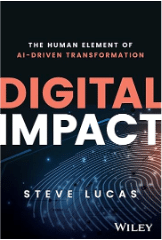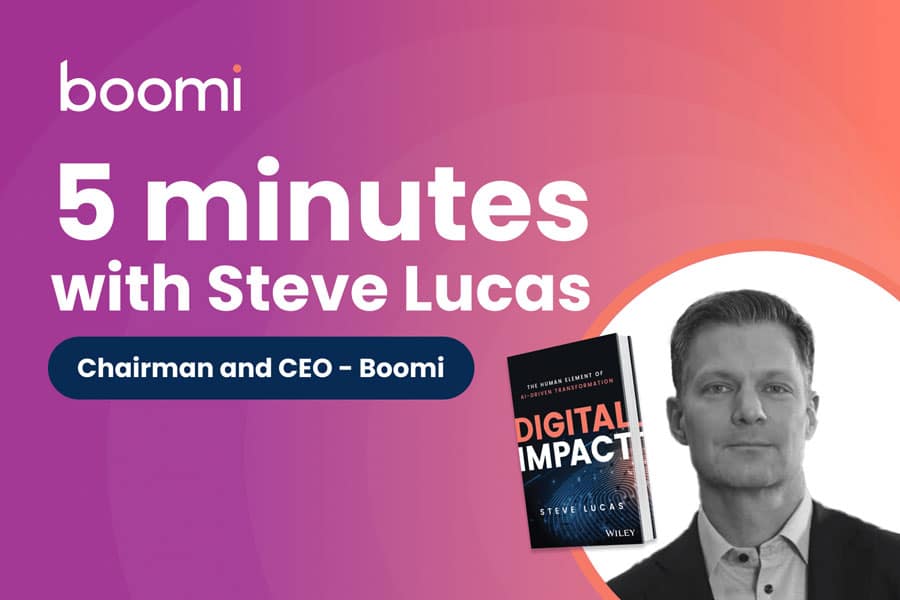Boomi interviews business leaders to learn about market trends they see and what makes their organizations successful. We also get their hot takes on pizza integrations.
Steve Lucas has plenty of experience writing business books. But he feels his latest, “Digital Impact: The Human Element of AI-Driven Transformation,” has a greater sense of urgency. That’s because we’re living in unprecedented times with the rise of artificial intelligence and agentic systems.

“AI is here to stay,” he said. “Personally, I believe AI will be bigger than the Internet when we have the opportunity to look back. This is the moment when everything changed.”
Lucas is a multi-time CEO who has spent nearly three decades building software companies. At Boomi, he leads a business at the forefront of an agentic future by showing organizations how to solve the inherent fragmentation of their digital systems so they can manage agents and succeed in the AI era.
But in “Digital Impact,” Lucas isn’t pitching a product. He’s selling big ideas about how technology can help people and how the world is a better place when everything is connected. Lucas believes the same principle applies to businesses. The book provides a roadmap for organizations to finally create smooth-running digital processes – right when they’re needed most.
“Digital Impact is about solving chaos,” he added. “It’s about eliminating complexity and helping your organization thrive with AI, and do so in a way that’s responsible, ethical, and empowers the people within your organization.”
At Boomi’s recent revenue kickoff meeting, I had the opportunity to meet with Lucas to discuss the age-old issue of systems not communicating with each other, why managing “agent sprawl” is so critical, and how his experience with Type 1 diabetes motivated him to become the CEO of a company specializing in digital connectivity. Our conversation has been lightly edited for length (although it might be a little longer than the “five-minute” title) and clarity.
Why will a reader benefit from this book?
Steve Lucas: I’ve been working in software for 30 years, and the promise is always, “This new thing is going to make it easier and better.” We’ve gone from on-premises to cloud applications to mobile. Now, in the era of AI, we’re hearing again: “This will make it easier.” But the reality is we live in an IT world full of chaos. Businesses struggle with organizing their applications, data, and APIs to create frictionless processes that make their businesses work. It’s always been a problem. “Digital Impact” addresses these by breaking down the solutions into bite-sized chunks so your organization can ultimately use AI to improve things.
Why is “the human element” essential to any discussion about AI?
Steve Lucas: AI is meaningless without humans. Number one, we gave AI the gift of existence. Number two, AI will need humans to succeed. There will always be humans in the loop. I hear all of this talk about AI eliminating roles for humans. I don’t think so. I think it will make us superhuman. It’s going to transform everything. I think we should talk more about the era of the superhuman thanks to AI. What I loved most about writing the book was focusing on the human beings behind the stories. It looks at amazing organizations that have achieved great things with technology. They’re practical, real-world scenarios of how AI and humans will shape the future together.
Can you give some examples?
Steve Lucas: There are inspiring stories too good not to be told. I talk about the American Cancer Society, Australian Red Cross, Tony’s Chocolonely, and many other mission-oriented businesses driving real digital impact. Just think about the critical nature of Australian Red Cross. Their success isn’t the integration and automation of their processes. It’s the outcome of changing and saving lives. That’s what many businesses in this book do, and it’s truly profound. Many business books are conceptual in nature on topics like “How organizations drive more efficiencies through better business processes.” But I love stories about real people making a real difference.
A thread that runs through the book is your belief in the importance of connection.
Steve Lucas: The power of connection has deep-rooted meaning for humans. It goes back to cave drawings scratched on walls made tens of thousands of years ago. It transcends time because you look at a cave drawing today and know what they were communicating. Today, we have the compounding effect of technology with mobile phones, the Internet, and AI. But every time we build a new way to connect, it creates complexity. We certainly see it in software with fragmentation.
Let’s explore commercial software in 10 seconds. None of it talks to each other! Microsoft doesn’t talk to Oracle, which doesn’t talk to SAP, and on and on. They have no incentive to connect with competitors. These are walled gardens that want to control your data. You need to tear those walls down to create seamless connectivity that will drive a frictionless business. That’s why we focus on connecting things at Boomi.
AI is only adding to that complexity, right?
Steve Lucas: Right. When I first used ChatGPT, I probably did the same thing as everyone else. I told it to do something like write a Star Wars poem in the language of Yoda. It was bewildering. It was much like the first time I used the Internet in the mid-90s. The hair on the back of my neck stood up, and I realized, “This is going to change everything.” And what’s happened in the last two years has been dizzying. I’ve seen more innovation in a week than I sometimes saw in years. Enterprise software has always followed a well-worn path. It’s always been an if-then-else proposition. It’s totally different now because AI has given software the ability to reason, make decisions, and even ignore its programming if there might be a better path. That’s powerful. Digital Impact explores what AI will do for our organizations now that we’ve opened Pandora’s Box.
How do you open that box safely?
Steve Lucas: You can’t use AI without first taking critical enablement steps. You’re nothing without good data. The adage about “garbage in, garbage out” still holds true. Then, you have to enable a smooth transfer of that data because AI is only as good as the information. AI can’t be a standalone island that doesn’t touch the rest of your business. When AI is integrated, it will transform everything. It’s why I spend a lot of time at my company talking about how we can embed AI into everything we do.
You’ve said the rewards of autonomous agents also come with risks — what are those risks?
Steve Lucas: We’re all hearing about AI agents everywhere. The possibilities are limitless with a hyperproductive workforce, self-adapting processes, and smarter, faster decision-making while maximizing cost savings. These are powerful promises. However, if left unmanaged, agents can become big problems when you don’t learn to control the chaos that AI can also inject into your organization. There’s the potential for security gaps and data breaches. These could create nightmares. Turning out agents without addressing all of that leaves you bound to fail.
How do you strike the right balance between adopting AI fast and doing it responsibly?
Steve Lucas: The promise of AI and the risk of AI is a razor’s edge. Everyone knows the cautionary tale of Blockbuster Video, where if you don’t move quickly enough, your business will become irrelevant. With AI, I believe there will be a thousand stories like Blockbuster Video. So we’re all feeling the pressure to get out in front of our competitors and adopt AI. But that can’t come with the sacrifice of explainability. We have to understand why AI says, “Hire this person, and not that person.” We need to know if bias is built into the model. If AI denies somebody a loan, it better be explainable. Walking that fine line is challenging, but we can do it with the right infrastructure, the right comprehension of our processes, and the right plan to implement AI. We see our customers moving ahead with confidence thanks to the infrastructure we provide.
You’ve said it’s no accident that, as a diabetic, you’re running a software company specializing in connectivity. Will you explain that?
Steve Lucas: When I was much younger, I was diagnosed with Type 1 diabetes. Your immune system says, “Hey, pancreas, I don’t like you!” You end up with a lifetime dependence on insulin. I would have to finger-stick myself 10 times a day and then inject myself with insulin another 10 times a day. It was a constant chemistry experiment. Connectivity changed everything in my life. As we’re talking, I have an insulin pump attached to one side of my abdomen and an insulin sensor on the other. Those two devices now talk to each other, allowing me to live a richer life. That’s why I’m obsessed with connectivity. How the pump and sensor communicate also translates into the health of organizations. Businesses are healthier when they’re connected, and everything works together.
Why did you feel compelled to write this book?
Steve Lucas: No one just wants to install software. No one wants to do digital transformation for its own sake. They want to change people’s lives. They want to save lives. They want to make people happier. This mission that organizations have is the story I wanted to tell. We’re at a great point of technology convergence like none of us have ever seen. I’m not sure we know exactly where this is going. But with AI, everything will change. Things like personalized medicine and self-optimizing businesses seemed like science fiction just two or three years ago. They’re not. They’re science facts. The book aims to widen the reader’s aperture to understand this convergence is not 20, 10, or even five years away. It’s now. We can build a better world with these technologies.
We can’t let you go without asking our favorite question. How do you prefer to “integrate” your pizza?
Steve Lucas: Mine is a supreme pizza. It’s the perfect integration of protein, carbs and fat. It’s named supreme for a reason.
Up Close With Steve Lucas
Role: Chairman and CEO of Boomi
Family: Wife Shelley, two children
Home: Denver
College: Bachelor’s degree in business from the University of Colorado
Career: Steve has held senior executive roles at some of the world’s leading cloud organizations, including Marketo, iCIMS, Adobe, SAP, Salesforce, and BusinessObjects. As CEO, he led Marketo and iCIMS’ growth and transformation, driving successful multi-billion-dollar acquisitions for both organizations. His previous books include “Engage to Win.” He also dedicates time to raising awareness, education, and funds to find a cure for diabetes.
Cool Fact: Steve and his son like to restore and upgrade high-performance cars in their free time.
Watch a short clip from Steve sharing why you’ll want to read “Digital Impact”:
“Digital Impact: The Human Element of AI-Driven Transformation” will be released on April 15. You can pre-order your copy today!


 English
English 日本語
日本語
